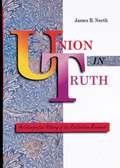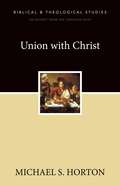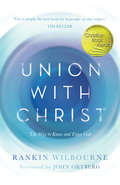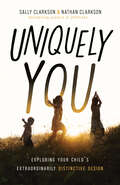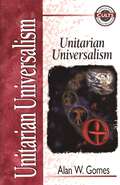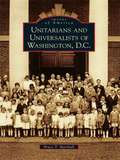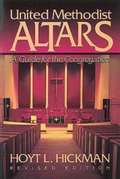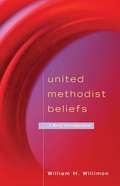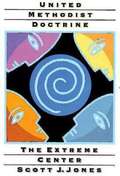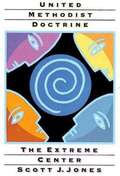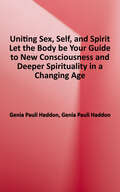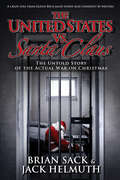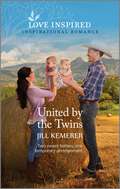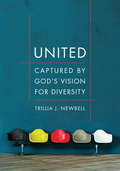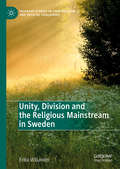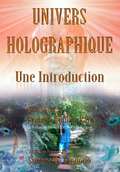- Table View
- List View
Union in Truth-spec: An Interpretive History of the Restoration Movement
by James B. NorthAn interpretive history of the Christian Restoration Movement.
Union with Christ: A Zondervan Digital Short
by Michael S. HortonDerived from Michael Horton’s recently released The Christian Faith, this digital short presents a full theological investigation into the biblical concept of union with Christ. Horton covers the nature of this union, exegetical development of the concept, and both historical visions and contrasting paradigms of it. He also draws connections between a Christian’s ongoing union with his or her Savior and grace, ontology, essence and energies, and covenant—an altogether masterful sketch of a beautiful and mysterious spiritual reality.
Union with Christ: The Way to Know and Enjoy God
by Rankin WilbourneTo experience why the gospel is good news and answer life's most foundational questions about identity, destiny, and purpose, we must understand what it means to be united to Christ.If you are a Christian, the Bible says that Christ has united his life to yours, that you are now in Christ and Christ is in you. This almost unfathomable truth is the central theme of the Bible from Genesis to Revelation. Yet few Christians today experience or enjoy this reality. Union with Christ reveals the transformational power of this ancient doctrine while addressing the basic questions of the human heart:Who Am I?Why Am I Here?Where Am I Headed?How Will I Get There?Nothing is more practical for living the Christian life than union with Christ. The recovery of this reality provides the anchor and engine for your life with God--for your destiny is not only to see Christ, but to actually become like him.
Uniquely You: Exploring Your Child's Extraordinarily Distinctive Design
by Sally Clarkson Nathan ClarksonYou are the unique child of God called to raise unique children of God. We are wonderfully different. That&’s God&’s beautiful, creative, astonishing design and plan. But how do we faithfully see and parent children who are His unique creations?You observe it every day in the way your kids think, talk, play, create, relate, read, write, dream, decide, and do life. We celebrate their unique attributes, but we also recognize that every beautiful child comes with particular challenges. We need creative parenting that&’s able to provide specialized love and guidance.Uniquely You, by best-selling authors Sally Clarkson and her son, Nathan Clarkson, is filled with biblical and life-learned wisdom for helping kids become and enjoy being the person God has designed them to be. Parents discover the unique personalities, learning, and love languages of their children. The Clarksons help you imagine discipline and dreams that fit your unique kids.Our kids have a designed place in God&’s story. Uniquely You is the guidebook for partnering with Him in the journey of discovering their unique roles. Your kids will say with confidence and joy, &“I am the only me!&”
Unitarian Universalism (Zondervan Guide to Cults and Religious Movements)
by Alan W. GomesFast, informed answers to the challenges of false religions -- This is an age when countless groups and movements, new and old, mark the religious landscape in our culture. As a result, many people are confused or uncertain in their search for spiritual truth and meaning. Because few people have the time or opportunity to research these movements fully, the Zondervan Guide to Cults and Religious Movements series provides essential information and insights for their spiritual journeys. The second wave of books in this series addresses a broad range of spiritual beliefs, from non-Trinitarian Christian sects to witchcraft and neo-paganism to classic non-Christian religions such as Buddhism and Hinduism. All books but the summary volume, Truth and Error, contain five sections: -A concise introduction to the group being surveyed -An overview of the group’s theology — in its own words -Tips for witnessing effectively to members of the group -A bibliography with sources for further study -A comparison chart that shows the essential differences between biblical Christianity and the group -- Truth and Error, the last book in the series, consists of parallel doctrinal charts compiled from all the other volumes. Three distinctives make this series especially useful to readers: -Information is carefully distilled to bring out truly essential points, rather than requiring readers to sift their way through a sea of secondary details. -Information is presented in a clear, easy-to-follow outline form with “menu bar” running heads. This format greatly assists the reader in quickly locating topics and details of interest. -Each book meets the needs and skill levels of both nontechnical and technical readers, providing an elementary level of refutation and progressing to a more advanced level using arguments based on the biblical text. The writers of these volumes are well qualified to present clear and reliable information and help readers to discern truth from falsehood.
Unitarians and Universalists of Washington, D.C.
by Bruce T. MarshallUnitarians established a church in the nation's capital in 1821, and the first Universalist sermon in Washington was presented at city hall in 1827. Since these beginnings, Washington-area Unitarians and Universalists have created congregations that affirm ideals of religious liberalism: a commitment to religious freedom, a reasoned approach to faith, a hopeful view of human capacities to create a better world, and the belief that God is most authentically known as love. Images of America: Unitarians and Universalists of Washington, D.C. features prominent figures such as Robert Little, an English Unitarian who fled his native land and became minister of First Unitarian Church of Washington; political rivals John Quincy Adams and John C. Calhoun, both founding members of the congregation; and Clara Barton, who organized the American Red Cross after her experiences on the battlefields during the Civil War. In 1961, Unitarians and Universalists joined together, and the story continues as Unitarian Universalists interpret the values of religious liberalism for each new generation.
United Methodist Altars: A Guide for the Congregation (Revised Edition)
by Hoyt L. HickmanThis basic, fully illustrated manual for congregational leaders explains how to prepare the sanctuary and its furnishings for the celebration of worship and sacraments throughout the Christian year. This practical, informative guide is an indispensable companion for worship committees, altar guilds, or individuals whose responsible for these vital tasks in their church. United Methodist Altars includes: care, cleaning, and storage instructions for all vestments and appointments; a calendar of the Christian year, with appropriate colors for each season; responsibilities and suggested organizational structure for the altar guild; an explanation of the history and meaning of worship furnishings; preparation instructions for the various United Methodist services; and, a glossary.
United Methodist Beliefs: A Brief Introduction
by William H. WillimonThis brief introduction spells out the major beliefs of the United Methodist Church in a clear, nontechnical style. William Willimon, the beloved United Methodist author, preacher, teacher, and bishop, discusses the great theological themes that United Methodists share in common with all Christians as well as the particular accents and emphases that characterize United Methodist understandings of Christian doctrines. In his engaging style, Willimon opens the door for further study, challenging the reader to move toward a continuing reflection on their faith. This guide will be of great value to those who are beginning their study of United Methodist beliefs as well as those who have long been in the church and want a helpful way to refresh their understandings of the distinctiveness of United Methodist doctrine.
United Methodist Doctrine: The Extreme Center
by Scott J. JonesThroughout this book, Scott J. Jones insists that for United Methodists the ultimate goal of doctrine is holiness. Importantly, he clarifies the nature and the specific claims of "official" United Methodist doctrine in a way that moves beyond the current tendency to assume the only alternatives are a rigid dogmatism or an unfettered theological pluralism. In classic Wesleyan form, Jones' driving concern is with recovering the vital role of forming believers in the "mind of Christ, " so that they might live more faithfully in their many settings in our world.
United Methodist Doctrine: The Extreme Center
by Scott J. JonesThroughout this ebook, Scott J. Jones insists that for United Methodists the ultimate goal of doctrine is holiness. Importantly, he clarifies the nature and the specific claims of ""official"" United Methodist doctrine in a way that moves beyond the current tendency to assume the only alternatives are a rigid dogmatism or an unfettered theological pluralism. In classic Wesleyan form, Jones' driving concern is with recovering the vital role of forming believers in the ""mind of Christ, "" so that they might live more faithfully in their many settings in our world.
United Methodist Questions, United Methodist Answers: Exploring Christian Faith
by F. Belton Joyner Jr.With its question-and-answer format, and clear, jargon-free writing, this volume is an excellent resource for learning about the United Methodist Church. F. Belton Joyner Jr. , a veteran pastor and popular author, introduces the reader to key United Methodist beliefs and practices through seventy-eight questions and answers.
United Sex, Self and Spirit: Let the Body by Your Guide to New Consciousness and Deeper Spirituality in a Changing Age
by Genia Pauli HaddonThis prophetic work claims we carry in our own bodies, male and female, an accurate compass guiding humankind toward a spiritual rebirth of civilization. Dr. Haddon shows how our own bodies teach us what we need to know—as individuals and as a culture—to accomplish our transition into this new millennium. As practical as it is visionary, this guide to the next turning point in human evolution offers examples and exercises supporting personal ventures into new spiritual experiences. Georg Feuerstein says in his Introduction, "This visionary book boldly leaps over established boundaries...straight to the heart of our modern malaise. It helps us understand the ‘grammar’ of our civilization: how we experience ourselves as men and women, and how that experience shapes our thinking about everything including our conception of the Divine."
United States History (3rd Edition)
by Mark Sidwell Timothy KeeseePresents the history of the United States from a Christian point of view. Topics covered include: horizons, forge, nation, crisis, quest, leadership and challenge.
United States History for Christian Schools (2nd Edition)
by Mark Sidwell Timothy KeeseePresents the history of the United States from a Christian point of view.
United States History in Christian Perspective: Heritage of Freedom (3rd edition)
by Michael R. LowmanFrom perilous beginnings on the shores of a wilderness continent, the United States of America has become a leader of nations and the bastion of freedom for the world. This frontier wilderness, so far removed from the civilization of Europe and for so many centuries hidden from it altogether, has given birth to the highest civilization the world has ever known. Originally settled as an outpost of Europe, this land quickly became the country to which Europe and the rest of the world looked for leadership, protection, and inspiration toward higher planes of freedom, responsibility, and human dignity.
United States Jewry, 1776-1985: Volume 2, The Germanic Period
by Jacob Rader MarcusIn United States Jewry, 1776-1985, the dean of American Jewish historians, Jacob Rader Marcus, unfolds the history of Jewish immigration, segregation, and integration; of Jewry's cultural exclusiveness and assimilation; of its internal division and indivisible unity; and of its role in the making of America. Characterized by Marcus's impeccable scholarship, meticulous documentation, and readable style, this landmark four-volume set completes the history Marcus began in The Colonial American Jew, 1492-1776. <P><P> The second volume of this seminal work on American Jewry covers the period from 1841 to 1860. Unlike the early Jewish settlers, these immigrants were Ashkenazim from Europe's Germanic countries. Marcus follows the movement of these "German" Jews into all regions west of the Hudson River.
United States Jewry, 1776-1985: Volume 4, The East European Period, The Emergence of the American Jew Epilogue
by Jacob Rader MarcusIn United States Jewry, 1776-1985, the dean of American Jewish historians, Jacob Rader Marcus, unfolds the history of Jewish immigration, segregation, and integration; of Jewry's cultural exclusiveness and assimilation; of its internal division and indivisible unity; and of its role in the making of America. Characterized by Marcus's impeccable scholarship, meticulous documentation, and readable style, this landmark four-volume set completes the history Marcus began in The Colonial American Jew, 1492-1776. <P><P> In the fourth and final volume of this set, Marcus deals with the coming and challenge of the East European Jews from 1852 to 1920. He explores settlement and colonization, dispersal to rural areas, life in large cities, the proletarians, the garment industry, the unions, and socialism. He also describes the life of the middle and upper class East European Jew. Special attention is paid to the growth of Zionism. In the epilogue, Marcus writes about the evolution of the "American Jew."
United States vs. Santa Claus
by Brian Sack Jack HelmuthThe comedic minds behind TheBlaze TV's hit show The B. S. of A. with Brian Sack bring you their hilarious vision of Christmas Future-or possibly sooner. What happens when the Scrooge-iest Washington politicians take on the jolliest soul of all time? Can a scandal-plagued administration distract the American public by bringing Santa to his knees? Can a bumbling bureaucracy destroy the reputation of the most popular man in the Northern Hemisphere? Spoiler alert: YES! And faster than you can say ho-ho-ho! This is the sad story of the real war on Christmas-and how the NSA, IRS, OSHA, and every other acronym in Washington came gunning for the man in red with everything they've got: two-thousand page reports on the environmental impact of reindeer farts . . . unionized elves . . . suspicious audits . . . character assassination . . . and all the other cruel and unusual tactics of an out-of-control government. Yes, Virginia, there was a Santa Claus. This is his story.
United by the Twins: An Uplifting Inspirational Romance (Wyoming Legacies #2)
by Jill KemererThey can&’t agree on anything… Except how to care for his twin nieces After inheriting a building from her great-aunt, Reagan Mayer moves to Wyoming to open the small-town shop she&’s always dreamed of. There&’s just one problem: rancher Marc Young wants the storefront for his mother. But when a family emergency puts a pause on their dispute, leaving them to care for his twin nieces, can Reagan and Marc find a way to communicate, to trust…and to love?From Love Inspired: Uplifting stories of faith, forgiveness and hope.Wyoming Legacies Book 1: The Cowboy's Christmas CompromiseBook 2: United by the Twins
United: Captured by God's Vision for Diversity
by Trillia J. NewbellWhat&’s the view from where you worship—racially diverse or racially monochrome?On the Last Day every tongue and tribe will be represented in the glorious chorus praising God with one voice. Yet today our churches remain segregated. Can we reflect the beauty of the last day this day? United will inspire, challenge, and encourage readers to pursue the joys of diversity through stories of the author's own journey and a theology of diversity lived out. It&’s time to capture a glimpse of God&’s magnificent creativity. In the pages of United, Trillia Newbell reveals the deeply moving, transforming power of knowing—really knowing—someone who is equal yet unique. As we learn to identify in Christ rather than in our commonalities, we begin to experience the depth and power of gospel unity.
United: Captured by God's Vision for Diversity
by Trillia J. NewbellWhat&’s the view from where you worship—racially diverse or racially monochrome?On the Last Day every tongue and tribe will be represented in the glorious chorus praising God with one voice. Yet today our churches remain segregated. Can we reflect the beauty of the last day this day? United will inspire, challenge, and encourage readers to pursue the joys of diversity through stories of the author's own journey and a theology of diversity lived out. It&’s time to capture a glimpse of God&’s magnificent creativity. In the pages of United, Trillia Newbell reveals the deeply moving, transforming power of knowing—really knowing—someone who is equal yet unique. As we learn to identify in Christ rather than in our commonalities, we begin to experience the depth and power of gospel unity.
Unity Is Peace
by Sri Mata Amritanandamayi DeviIn the book, the world-renowned Mahatma, Amma, captivates hearts at the 50th Anniversary of the United Nations. Amidst a diverse assembly of religious leaders, she advocates for a paradigm shift, where spirituality informs global values of caring, compassion, and tolerance. Amma's message of love and unity touches all, transcending borders, faiths, and backgrounds. As she shares the essence of true compassion and its transformative power, attendees find solace and hope in a troubled world. With insightful interpretations by Swami Amritaswarupananda, this powerful book delves into the universal truth that Divine Love can heal humanity and foster a harmonious future for generations to come.
Unity in Faith?: Edinoverie, Russian Orthodoxy, and Old Belief, 1800–1918
by J. M. WhiteThe little known history of an attempt to end a religious schism in imperial Russia, and the questions it raised about church and state.Established in 1800, edinoverie (translated as “unity in faith”) was intended to draw back those who had broken with the Russian Orthodox Church over ritual reforms in the seventeenth century. Called Old Believers, they had been persecuted as heretics. In time, the Russian state began tolerating Old Believers in order to lure them out of hiding and make use of their financial resources as a means of controlling and developing Russia’s vast and heterogeneous empire.However, the Russian Empire was also an Orthodox state, and conversion from Orthodoxy constituted a criminal act. So, which was better for ensuring the stability of the Russian Empire: managing heterogeneity through religious toleration, or enforcing homogeneity through missionary campaigns? Edinoverie remained contested and controversial throughout the nineteenth and early twentieth centuries, as it was distrusted by both the Orthodox Church and the Old Believers themselves. The state reinforced this ambivalence, using edinoverie as a means by which to monitor Old Believer communities and employing it as a carrot to the stick of prison, exile, and the deprivation of rights.In Unity in Faith?, James White’s study of edinoverie offers an unparalleled perspective of the complex triangular relationship between the state, the Orthodox Church, and religious minorities in imperial Russia.
Unity, Division and the Religious Mainstream in Sweden (Palgrave Studies in Lived Religion and Societal Challenges)
by Erika WillanderThis book presents new conceptual and methodological approaches to studying religiosity in Europe. From her unique background of working with the Church of Sweden statistics and official statistics on the increasing religious diversity in Sweden, Willander illustrates how previous and current methods of analysing religiosity overlook substantial aspects in patterns of affiliation, belief and practice. Unity, Division and the Religious Mainstream in Sweden draws on the sociological imagination in the sociology of religion to offer a new and empirically-driven analytical framework that shifts the focus to religious change in general, and will contribute greatly to ongoing discussions about majority forms of religiosity and their social relevance in contemporary times. It will be of use to students and scholars with a focus on the sociology of religion, as well as sociology, political science, epistemology and media studies.
Univers Holographique: Une Introduction
by Brahma Kumari Pari SimonaLisez ce livre dans l'intention de comprendre les profondeurs de ce qui est expliqué. Ne considérez pas seulement comme «matériel de lecture». Au lieu de simplement lire le livre pour connaître l'Univers Holographique, continuez à contempler ce que l'autrice a dit jusqu'à ce que vous rencontriez et compreniez ce qui se dit sur l'Univers Holographique. Garder un esprit ouvert et clair (tout en visualisant ce qui est lu) vous aidera à expérimenter ce que l'autrice a vécu et/ou vous pourriez avoir d'autres expériences pertinentes. En conséquence, vous pourrez comprendre ce que l'autrice explique. Votre capacité à avoir des expériences dans l'Univers Holographique augmentera, car vous continuez à lire ce livre encore et encore jusqu'à ce que vous l'avez compris. Il y a des explications, dans cet livre, sur: 1. les différentes divisions et la nature de l'univers holographique. 2. comment tout se passe selon le Drame Mondial (registres akashiques). 3. comment les gens vivent dans deux types de mondes, le monde réel et le monde holographique, en même temps. 4. le film holographique de l'hologramme auquel nous participons. 5. comment les différents types de mondes existent. 6. comment les énergies quantiques matérialisent les corps physiques et le monde physique à travers l'Univers Holographique. 7. comment le processus de création se déroule à travers les vortex et les chakras. 8. comment les dimensions subtiles, les corps holographiques et les corps subtils sont créés. 9. comment l'aura est utilisée pendant les expériences. 10. comment les énergies quantiques de densités différentes matérialisent un type différent de monde réel dans lequel nous vivons. 11. comment l'Univers Holographique change quand le monde se transforme. 12. la méditation et la connaissance de Brahma Kumaris. 13. Expériences près de la mort. 14
